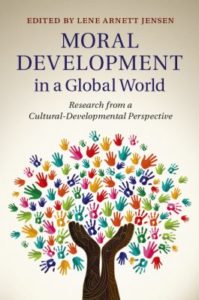 2015, Cambridge University Press.
2015, Cambridge University Press.
The central thesis is that humans are born with a shared moral heritage and that, as we develop from childhood into adulthood, we branch off in diverse directions shaped by culture – resulting in novelty and contention. An international group of eminent and cutting-edge scholars from anthropology, psychology, and linguistics addresses this timely topic and explores how gender, social class, and “culture wars” between liberals and conservatives play into moral development across cultures.
Table of Contents
More Info at Cambridge University Press
Reviews
‘This book offers an exceptionally subtle and sophisticated exploration of cultural pluralism and universality in moral understanding and development. From its deeply thoughtful foreword and integrating first chapter right through to its sharply insightful commentaries, it will not only enrich your knowledge, it will make you think!’
Anne Colby, Stanford University, California
‘This is an exceptionally engrossing volume providing insights and challenges to the Western individualistic psychology of morality. Using a ‘cultural-developmental approach’, supported by multidisciplinary empirical evidence from diverse socio-cultural contexts, it proposes a theory of moral development which embraces both universality and multiplicity.’
Cigdem Kagitcibasi, Koç University, Istanbul
‘This volume presents a major empirical and theoretical advancement in moral reasoning from a cultural-developmental perspective. The wealth of data and analyses and new conceptual insights drawn from diverse cultures would undoubtedly enrich anyone’s understanding of human development.’
Jin Li, Brown University, Rhode Island
‘The present volume on moral development by Lene Jensen is a noteworthy contribution bridging culture and development. It expands the horizon of research in the area by looking beyond the individualistic justice and rights orientation to ethics based on social and spiritual values governed by cultural contexts, thereby integrating universality and cultural relativity. It is an excellent example of culture inclusive developmental psychology.’
T. S. Saraswathi, Maharaja Sayajirao University of Baroda, India